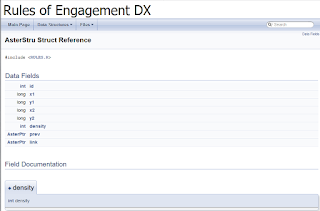My first goal was to
pull the code for ROE into a modern development environment. Even
though I want to use POSIX as my baseline, I decided to pick Visual
Studio 2015 as my IDE. It has a few things going for it. First, some
of the legacy headers originally developed for QuickC are still
hanging around. Direct.h is one example (used for directory
management). However, it appears that Allegro also has wrappers for
filesystems too. I may have to do a pass to see if most of my POSIX
stuff may have an Allegro equivalent. I may have to retarget later
on.
The Allegro
libraries are available via NuGet, which makes life much easier. On a
previous project, I literally spent two days trying to get Allegro to
work with Code::Blocks under Win10, which is my preferred IDE for GCC. Visual
Studio is great, but it’s compiler has some glaring deficiencies.
Two of my favorites is as follows:
1) In 2017, MSVC
STILL can not process
Unicode string literals. You want to see the IDE go bananas? Plop an
emoji into the source. (It’s a valid Unicode character). It
will stop everything telling you that there is an invalid character
from the current codepage and it’s unable to save. That’s right,
Microsoft still uses codepages for non-Latin text. This shouldn’t
be a huge problem as I don’t plan on using Unicode (for now)
2) Microsoft
absolutely, positively refuses to support C99 and above. It’s
considers C a “deprecated” language. Now I know that this may
seem a strange thing for whine about, as C++ is a superset of C.
However there exists little things that can be irksome such as.
-Bool support (Not
really needed as the ROE typedef’ed it’s own Boolean type.)
-Universal character
names, for example...
int 番号
= 1;
..is invalid. That's might be a good thing though.
-Variable length
arrays
-Etc…
To Microsoft’s
credit, they recommend that if you need to use an actual C compiler,
it does have front-end support for Clang. As ROE was written in 1991,
I don’t think I need to rip out half my toolchain be able to create
obnoxious variable names.
Other than that,
I’ve also put the code into an honest-to-goodness version control
system. The Git support in 2015 is pretty sweet. I’m keeping the
repo local for now, I can probably spin up a git server on a Linux
kick-box I have hanging around if I feel inclined to work remotely.
One of the last
things I’ve also set up is Doxygen. It basically scans the source
tree and auto-generates documentation so I can follow where
everything is. ROE was written before Object Orientated Programming
was a mainstream thing. Globals Globals Gobals! Lots of them.
Encapsulation? What’s that? Doxygen helps by giving me a local
web-based source code search engine. I don’t have to put on snorkel
gear and dive in to see where some pesky extern was declared at. I'm planning to merge into Doxygen most of the documenttation that was graciously given to me by OTSW. This means not only will there be living, portable code, but with plethora of inline documentation to go with it.
Looking good so far.


No comments:
Post a Comment